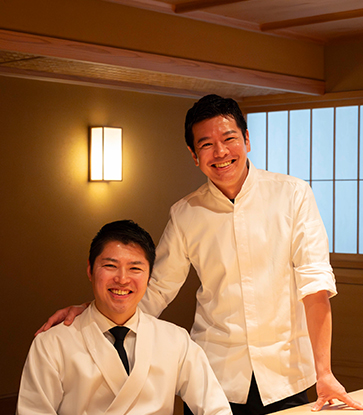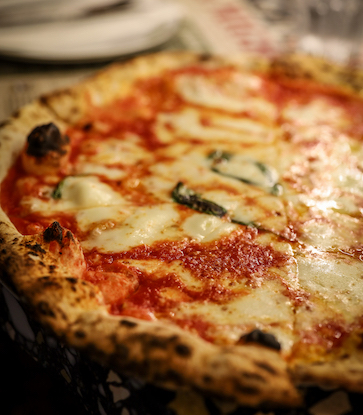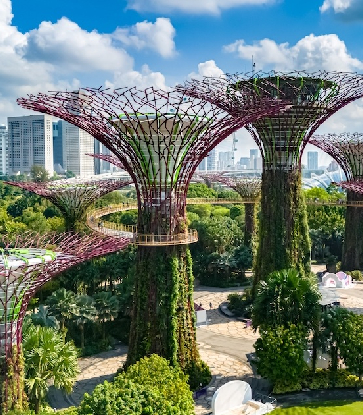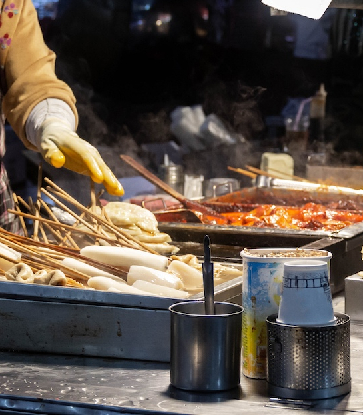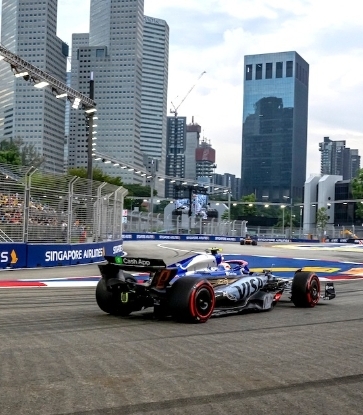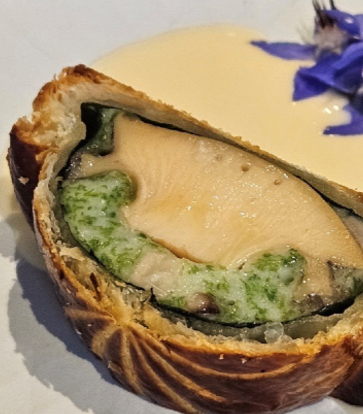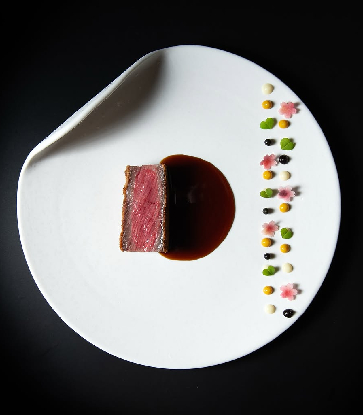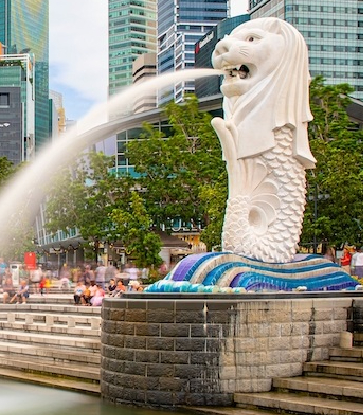Browsing through social media upon the aftermath of André Chiang’s 12-day residency at Raffles Hotel Singapore, one might come across a video with a caption stating that Chiang initially struck the video’s poster as a spiritual guru of sorts.
Recalling the memory of it and crafting this article, it’s not difficult to see the similarities between Chiang as a chef and the qualities upheld by a spiritual guru. Apart from being calm, collected, confident, and certain, there is a dedication of one’s life to religion — and in Chiang’s case, cooking seems to be his life’s creed, never once doubting that he was born to cook.
The Taiwanese chef jovially shares that he has seen many a familiar face throughout the duration of his elusive residency, with guests recounting stories and showing photos of their first meal — and for some, also their last — at the now-defunct two-MICHELIN-Starred Restaurant André, which shuttered in February 2018. Chiang’s face glows with gratitude as he shares this experience, thankful to once again be able to showcase his cooking in the Garden City.

You are a chef that exercises so much precision in your craft. Why did you choose this precise moment for your Homecoming residency?
This time, last year, was actually when the noma pop-up in Kyoto happened. René [Redzepi] is a very close friend of mine, having worked together in France. This event of his inspired me to push through with this Homecoming residency that I’ve been wanting to do for years now. Apart from finding the right venue that can fit my staff of 30, it was also important to find a place that could replicate the Restaurant André atmosphere to some degree, and Raffles Hotel Singapore was perfect, especially with its colonial setting and the outdoor greenery.
When I left Singapore six years ago, I’ve been waiting for an occasion to come back, and this was the precise moment that I felt I should.

The dining experience you provide is always so intentional and woven together beautifully into a singular story. Which chapter of your life do you feel you are living out right now?
I feel like I’m in a different period of my life at the moment; I have a different goal in life now compared to when I started out in Singapore. Back then, I was all about wanting to improve myself, expressing myself, and determining how far we can go as a team — coming to Singapore at the time and having my own restaurant felt like a personal achievement.
André in Singapore, I feel, is like a grown-up André; and then, in Taiwan, it's like André as a child, because of all my memories of the place. The moment I am in Taiwan, I always try to find that childhood memory because it’s what I'm attached to.
In Taiwan, I am rediscovering my roots with childlike wonder. I feel like a kid again, you know? I left Taiwan when I was 13 years old, and now I am getting reacquainted with my heritage.
“In life, you always go back to the period you're most familiar with, your comfort zone.”
Currently, I am contributing to society for different causes. I am also teaching in four different universities — not only about cooking, but also about the history of Taiwanese cuisine and Taiwanese flavours. Right now, the goal is all about education; about passing the baton to the younger generation.
What precisely about heritage cuisine do you want to pass on to the next generation?
It could be anything. There was one season where I did all classic dishes from the 13th to 19th century. For example, a pâté takes seven days to prepare. A duck takes two weeks, while a stock takes 16 hours. The younger generation will never have an opportunity to learn these unless someone shows them. It’s all in textbooks, but doing these actual steps in real life is hard to come by — like cooking en vessie (cooking in animal bladders), for example.
In this modern world, we receive information at such a quick pace. Everything is getting faster and faster. When I was learning culinary arts in France, the foundational teaching was that the longer you cook, the better the food will taste. But now, with the faster pace of life, technology presents a lot of shortcuts; but these cooking shortcuts also come with the risk of losing flavour.

What are your thoughts on cooking with authenticity these days, then?
While we are moving forward, we actually have to go two steps back and then three steps forward. It’s like a dance. It’s important to take a couple of steps back and get to know the origin of a certain dish, let’s say, a sauce. It’s important to know its foundations, its base flavours, how it was originally prepared — otherwise we lose the inspiration and the authenticity of the dish.
You know, everyone is looking at the same social media — whether you are in Norway or in Japan or in Australia. When I travel, I see almost the same dishes when I eat out. I believe it’s important to find that authenticity again and that uniqueness. Authenticity and heritage…for me, they are very important qualities to understand when it comes to cooking.

How have you been able to build reliable and trustworthy teams throughout the years?
We instantly expect to attract good people. But before that, it’s very important to build a good culture in order to attract these good people. So we need to rethink first.
I think for every one of us, may we be restaurateurs or chefs, we need to rethink the ways of building a good culture. What does a “good culture” mean to you? Because once you have a very clear answer for that, then, you attract the same type of person to come and work with you.
The way my team and I work together is very different from other restaurants or mentors. I never try to mould them into a certain way. For example, at Restaurant André, my team all worked in the same period of time as the restaurant’s tenure, but when they came out of the restaurant, they were completely different. They became their truest selves.
“My training consists of this principle: how do you find yourself when you work with us as a team?”
When you work in my team, you are a specialist of a certain thing — we are a team of specialists. So, the question is, what kind of specialist are you? You need to find your position in the group. Then, try to find your own strength; try to find out who you are.
So, throughout the years, the chefs under my wing discover themselves — their strength, their forte — compared to others. The moment they leave the restaurant, they are very clear on who they are and what they want.
How about you? How have you found yourself in cooking?
I have been cooking since I was 13 — I guess that’s sort of telling that it has always been in my blood. I have never thought of doing anything else.

Cooking, to me, is like writing in a journal. It’s an everyday thing. Whether you are facing the guest, facing the produce, or facing the environment, you have a natural inclination to reflect on the life in front of you in relation to your own.
Every day is different, and I rarely cook the same dish. Every period and every season of my life, my cooking is constantly evolving. Why? Because one does not write the same journal entry twice; one doesn’t write what he wrote yesterday.
Also, I am not a talkative person, so I speak through my cuisine. Every day is a reflection of yesterday — that’s simply the inspiration of how I create. I also believe that every creation is supposed to solve a certain problem. If it does not solve certain problems, like improving textures or tastes, then it’s not worth making.
Coming from your experience with Restaurant André here in Singapore, would you have done anything differently or are you 100% satisfied?
I am 100% satisfied. Why? It’s like the reason why I closed Restaurant André. It has achieved what it needed to. First, the achievement of running my own restaurant in Singapore, being able to try everything and pursue all the ideas I had then. Also, I had a great team that breathed with me. I had the perfect environment, happy guests…the achievements I feel I have accomplished during my time at Restaurant André in Singapore go beyond the accolades. It was an internal growth and evolution. I don’t want to attach myself too much to my past; I am just happy with what is.
Actually, I am grateful for two things: Restaurant André changed the perspective and ecosystem of the industry, and it built up the foundation of many young chefs. I feel like I have set a good example for them, seeing what they have achieved in life now. With that, I can say I have done everything.
How do you set goals for yourself?
I think that in every decade, you have to sit down and ask yourself what your next goal or mission will be. In this current decade I am living in, I aim to be a good and nurturing mentor.
“Give yourself a mission to fulfil every decade, and work hard on that mission. I believe everyone should do this.”
And then, don't look back. You set the goal, and then you work super hard on it, and then you achieve it, and then you move on. Give yourself another ten years and achieve another goal in life. That's how I see it.
What do you feel life is preparing you for next?
Honestly, I don’t know. I want to be able to really give back to society. I think I have done everything I could for Taiwan, or Singapore, or Asia as a whole. I feel I have done my part as a chef.
Now, I am training this young generation to stand on their own feet. The next thing I want to do is to share my experience to budding entrepreneurs and young chefs. I think there is still a gap from being an amateur to becoming a chef, from being a chef to becoming a restaurateur.

This type of training is very unique; it’s something born from experience, and I want to be that mentor that shares those experiences during that transition. We start from scratch, and maybe we’re lucky. Maybe we work hard, maybe we’re good at learning. And that’s how we come to where we are.
But going back, I remember why I set up RAW in Taipei 10 years ago, and it’s because I was lucky to have gone to France as a kid, but not every Taiwanese kid has an opportunity to do that. And what if they stay only in Taiwan? I would like for them to have the chance to get world-class, MICHELIN standard training in their own country. We want to open that platform for all the young chefs in Taiwan that might not have the ability or support from their families to work overseas, but they can have a lifetime of learning in a world class standard restaurant in Taiwan.
This is, I feel, my current mission in life.



